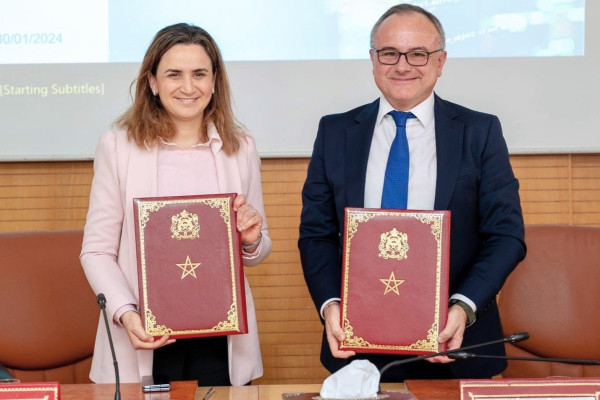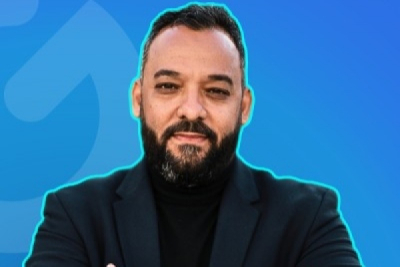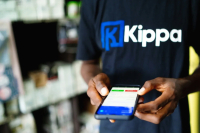In partnership with local and international players, Factory 619 offers a dynamic ecosystem and tailor-made programs to support entrepreneurs in Tunisia.
Factory 619, a global innovation and technology center based in Tunis, has been fostering entrepreneurship and technological advancement since its inception in 2017. The center’s mission is to establish and co-develop enterprises specializing in e-health, gaming, blockchain, and digital transformation.
Led by founders Mehdi Nakouri and Hédi Michau, it offers a broad spectrum of activities and programs, such as hackathons, challenges, networking events, and workshops. The center operates through four divisions: The Studio, The Foundry, The Forge, and The Garage.
The Studio, the center’s inaugural division, champions technological innovation by validating business concepts and transforming them into scalable tech start-ups. To date, The Studio has successfully launched seven startups, including 4Labs, a Software as a Service (SaaS) sales support solution for the pharmaceutical sector.
The Foundry division serves as a launchpad for entrepreneurs to establish startups and grow businesses. It aids CEOs by overseeing the product development process and bolstering commercial endeavors. Additionally, it provides strategic support to the Chief Technology Officer (CTO) for the company’s growth and market entry.
The Forge division provides entrepreneurs with bespoke services in technology, product creation, and innovation programs. The Garage division, on the other hand, cultivates a conducive entrepreneurial environment and fortifies start-ups through pre-incubation and pre-acceleration programs and events.
Factory 619 has forged several strategic partnerships to provide its entrepreneurs with optimal conditions for success. Partners include Tunisian radio station Express FM, the Mediterranean Development Initiative, Nextera, and the Athens Lifelong Learning Institute.
Melchior Koba
Morocco, in its pursuit of a digital transition program, recognizes the critical need for a digitally skilled workforce. The country has strategically partnered with experienced partners to address this challenge.
Morocco’s Ministry of Digital Transition and Administrative Reform on Tuesday announced a program contract with Maroc Numeric Cluster (MNC), a public-private entity, to enhance digital innovation. The contract was signed by Ghita Mezzour, Minister Delegate for Digital Transition and Administrative Reform, and Mehdi Kettani, President of MNC.
The program aims to bolster digital innovation by nurturing talent and aiding startups and SMEs. “This contract reflects the desire of both parties to strengthen the digital innovation ecosystem through several lines of action, including training and integration of talent, content production, dissemination of the culture of innovation, collaboration, and digital entrepreneurship, and support for the emergence of digital innovation projects in various economic sectors,” the Ministry stated.
Under this contract, MNC will undertake a pivotal role in training youth in ICT skills to ease their professional integration. The pilot phase targets 1,000 beneficiaries, with 734 already graduated and an anticipated integration rate of 72%.
The partnership will also promote startups via events, training, and collaboration with incubators, accelerators, professional associations, and partnerships. Regular monitoring, analysis, and studies will be conducted to identify trends and invigorate the sector.
These initiatives are part of Morocco’s new digital strategy, “Maroc Digital 2030”, succeeding the previous strategy that aimed to position Morocco as a leading digital and technology hub in Africa by 2025. The new strategy underscores the importance of talented, creative youth.
Samira Njoya
As 2023 concluded, numerous specialized companies and platforms are evaluating the capital invested in diverse ecosystems. This data holds crucial significance for the growth of the digital economy, particularly in the African tech ecosystem.
African fintech startups raised $852 million in 2023, a 56% decline from the record $1.9 billion secured in 2022, according to the 2023 edition of Partech Africa's Africa Tech Venture Capital report, published in January 2024. The number of deals also dropped by 48%, falling from 217 in 2022 to 113 last year.
Despite the decrease, fintech remains the most attractive sector for investors in Africa, accounting for 37% of all equity financing on the continent in 2023 and 24% of all deals. This is attributed to the sector's strong track record and continued relevance in addressing under-banking and promoting financial inclusion. Of the eight unicorns on the continent, seven operate in the sector, with only Jumia being in the e-commerce sector.
"Fintech plays a critical role in addressing infrastructural challenges in Africa. Beyond just being payment applications, these solutions are essential in enabling a wide range of ventures," the report said. "By establishing both local and cross-border solutions, and fostering key connections between individuals, businesses, and financial institutions, Fintech’s role remains integral to the ecosystem."
Despite the overall funding slowdown, the healthtech and agritech sectors saw growth in 2023. Healthtech funding rose 17% to $212 million, while agritech investments jumped 67% to $144 million compared to 2022.
Adoni Conrad Quenum
South African startup offerZen, which connects tech talent with businesses, announced last week it closed a €4 million funding round. The company plans to use the funds to develop its technology platform and expand its service offerings.
The Algerian entrepreneur initiated a platform designed to tackle the escalating issue of illegal parking. This platform aims to link drivers with vacant parking spots.
Algerian entrepreneur Oudda Abbes, a civil engineering graduate from the University of Science and Technology of Oran Mohamed Boudiaf (USTOMB), heads Garini, a mobile app for parking reservations.
Founded in 2017, Garini partners with property developers, private parking lots, and hotels to optimize their parking space usage. It aims to become a key player in the sharing economy through its parking solutions.
The startup has gained recognition in Algeria, winning first place at the 2020 Tunisian Hackathon and the logistics category at the 2021 Startup Challenge Algeria. In 2022, it was the Algerian winner of the Emerging Mediterranean Bootcamp and placed second at the GEC + Africa Regional Pitch Event. Additionally, it received the "Sustainable Cities" award from the Algerian Ministry of Knowledge Economy in 2023.
Abbes currently manages Oran's large parking lot and real estate company Oudda Isjane Immobilier. Before founding Garini, he worked as an inspection engineer at the National Technical Control of Construction Centre (CTC) from 2010 and later joined Ace Architecture as Senior Manager in 2016.
Melchior Koba
After numerous declarations, global tech giants are gradually deploying their investments in Africa. This time Google is investing in the development of top-tier infrastructure.
U.S. technology giant Google on Wednesday announced the opening of its first data center in Africa, located in Johannesburg, South Africa.
The facility, part of Google's $1 billion investment to boost Africa's digital transformation, is designed to support businesses on the continent with cloud computing resources needed to "evolve, innovate and compete in the global marketplace," according to a company press release.
"This marks our 40th cloud region globally, connecting Johannesburg to our secure global network," the release said, adding the center would offer Google Cloud services to businesses across Africa.
Google estimates Africa's internet economy could reach $180 billion by 2025, representing 5.2% of the continent's GDP. However, Google faces competition in the growing African cloud market. Rivals like Oracle, Amazon Web Services, and Microsoft already have a presence, while local players like Africa Data Centres are also vying for market share.
Adoni Conrad Quenum
Through its activities, events, and partnerships, Founders Factory Africa helps stimulate innovation and economic growth in Africa. It helps solve the social and economic problems facing many countries.
Founders Factory Africa, a startup accelerator and investor, is reshaping the startup landscape in Africa. Established in 2018 by Roo Rogers, Alina Truhina, and Sam Sturm, and headquartered in Johannesburg, South Africa, the firm is dedicated to fostering and scaling innovative startups, channeling fresh capital into the African continent, and generating systemic impact.
It aims to equip founders with the necessary funding, knowledge, and hands-on support to achieve commercial success. The firm cultivates and grows businesses in Africa across four sectors: healthcare, energy, fintech, and education, with an emphasis on scalability, technology, and impact.
Founders Factory Africa boasts a portfolio of over 55 companies, including Lipa Later and Asaak, spread across 11 countries in East, West, North, and Southern Africa. In August 2023, the accelerator raised $114 million to broaden its model to better cater to founders in the African tech ecosystem. Its hybrid investment approach merges company building, business engagement, and strategic investment to deliver large-scale solutions to consumers in sub-Saharan Africa.
The accelerator team, under the leadership of CEO Bongani Sithole, is entirely African, supplemented by key members from around the globe. It also benefits from the backing of corporate partners such as Standard Bank, Small Foundation, Netcare Group, and Mastercard Foundation.
Melchior Koba
Ethiopia's Ministry of Education said last week it distributed 3,790 tablets to 18,000 schools nationwide, aiming to digitize the teaching and learning process. The initiative, in partnership with the World Bank, seeks to equip schools with digital tools and strengthen teachers' digital skills. This follows the distribution of 1,000 tablets to high schools in 2023 for similar purposes, bringing the total to 4,790 devices distributed.
The Seychelles Council of Ministers has approved a new law to regulate virtual assets (VAs) and virtual asset service providers (VASPs), Vice President Ahmed Afif announced. The legislation, awaiting National Assembly approval, aims to foster responsible and sustainable growth in the burgeoning industry.
Nigerian fintech startup Kippa is shifting gears and venturing into the education technology (edtech) space, according to a Wednesday report by Techcabal. The company is developing an artificial intelligence (AI)-powered e-learning platform to facilitate the creation of online course modules and deliver bite-sized training sessions.
More...
In line with his ambition to establish Kenya as a digital hub in Africa, the Kenyan President traveled to Silicon Valley last November. He engaged in discussions with several U.S. technology leaders, encouraging them to invest in his country.
US technology giant Oracle is set to construct its second African data center in Nairobi, Kenya. The announcement was made on January 31, during a meeting held by President William Ruto with a delegation from Oracle, led by Scott Twaddle, the Senior Vice President in charge of products and industries at Oracle Cloud Infrastructure (OCI).
The initiative aims to accelerate the digital transformation of Kenya's government, public institutions, businesses, and startups. "We are delighted to see Oracle planning such an important investment in Kenya. [...] I am excited to see major technology companies like Oracle investing in Kenya and bringing state of the art technologies like AI and cloud applications that will benefit Kenyan citizens, especially in creation of jobs," Ruto said.
Data centers, the physical powerhouses behind the digital world, are experiencing a surge in growth across Africa. These facilities, which store, manage, and distribute essential data, offer the computing muscle needed for online services, applications, websites, and more. This growing demand stems from the continent's rapid digital transformation, with businesses and governments increasingly relying on cloud-based solutions.
While Africa currently houses less than 2%- According to the International Telecommunications Union– of the world's data centers, major players like Microsoft, Amazon, Oracle, and Huawei are taking notice, investing heavily in building new facilities across the continent. This expansion is driven by the need to address the existing gap in cloud infrastructure and capitalize on the region's immense potential for digital growth.
Adoni Conrad Quenum
With the ongoing digital transformation push across Africa, connectivity investments are surging continentwide. The aim is to close the digital gap and cater to all societal levels.
Algeria’s Minister of Post and Telecommunications, Karim Bibi Triki, announced on Monday, a substantial rise in the country’s international bandwidth capacity to 9.8 Tbit/s. This marks a significant increase from 7.8 Tbit/s in 2022, 2.8 Tbit/s in 2021, and 1.5 Tbit/s at the start of 2020.
According to the Ministry, the enhancement aims to provide increased flexibility, emphasizing the strategic role of international bandwidth in ensuring and maintaining Internet services.
The initiative is part of a broader strategy to augment Algeria’s international bandwidth capacity, coinciding with the deployment of a telecommunications infrastructure modernization and development program. The primary objective is to anticipate the escalating Internet demand and ensure ultra-high-speed access.
As per the “Digital 2023” report by international consultancy Datareportal, the median mobile Internet connection speed in Algeria via cellular networks reached 13.40 Mbps, marking an over 17% increase in the 12 months leading up to the start of 2023. Fixed-line Internet speeds reached 11.01 Mbps, rising by 1.23 Mbps compared to 2022.
The bandwidth expansion to 9.8 Tbit/s will facilitate the adoption of new technologies such as 5G, the Internet of Things (IoT), and other emerging services. It will also bolster network resilience, catering to the growing demand for services that require rapid data transmission, including video streaming, online gaming, and other bandwidth-intensive applications.
Samira Njoya
Senegal is fully committed to digitizing its entire healthcare system. In a bid to achieve its goals, the government is multiplying its initiatives in collaboration with all the stakeholders in the sector.
Senegal's state-owned digital infrastructure company, Sénégal Numérique SA (Senum SA), and the Ministry of Health and Social Action signed an agreement on Tuesday to speed up the digitization of the country's healthcare system.
According to Cheikh Bakhoum (photo, left), CEO of Senum SA, the agreement encompasses various activities, including the domestic hosting of health data, which was previously stored abroad. The data will now be housed within Senegal, specifically in national resource centers.
Under this three-year collaboration, Senum SA will aid in the execution of all digital projects within the sector, host data in the national data center, and enhance connectivity for healthcare facilities, among other tasks. The company will also augment the hosting capacity and bandwidth for digital health records, including the shared patient file (Dpp), telemedicine, the hospital information system, the geographic health system, the digitization of medicines, community health processes, and electronic health governance.
The partnership aligns with the 2023-2027 healthcare system digitization program (PDSS), a government-led initiative. The program, which has received significant financial backing from the World Bank to the tune of $50 million, coincides with the country’s efforts to construct data centers dedicated to storing and hosting national data. The most recent addition to this infrastructure is a Tier 3 data center, established in Diamniadio.
Samira Njoya
With a background in economics, he has served as an investment analyst for global corporations. Currently, he leads a firm that provides financial support for the acquisition of solar energy equipment to underserved communities.
South African entrepreneur Michael Heyink (photo), a University of Cape Town Economics graduate, co-founded and now leads Yellow, a startup focused on distributing and financing affordable solar home systems for low-income rural households.
Established in 2018 by Heyink and Maya Stewart, Yellow offers a solar system package that includes a panel, battery, four lamps, a cell phone charger, and a radio. The company also markets smartphones and larger solar systems.
Yellow has developed Ofeefee, a comprehensive sales force network solution for last-mile delivery. This platform automates recruitment and training, offers engaging incentives, and includes an e-commerce and task management engine to streamline informal processes. It facilitates digital inventory, delivery, and warranty service management, and provides real-time credit scoring and portfolio management services.
With its headquarters in South Africa, Yellow operates in Malawi, Rwanda, Madagascar, Uganda, and Zambia. The company employs over 1,000 agents and serves more than 480,000 customers across Africa. In June 2023, Yellow secured $14 million in Series B funding to bolster its presence in existing markets.
Before founding Yellow, Heyink worked as a strategy consultant at Monitor Group from 2012 to 2014. He later joined Agis Investment as an investment analyst in 2015, and subsequently worked as a private equity analyst at Metier, a private equity fund manager.
Melchior Koba















